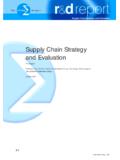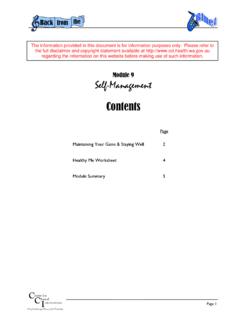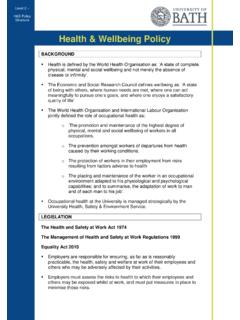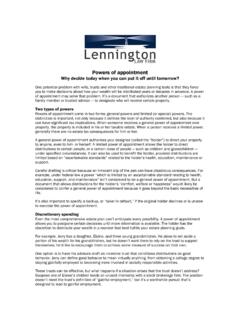Transcription of Economic Sustainability The business of staying in …
1 SustainabilityThe business ofstaying in businessDeborah Doane & Alex MacGillivrayNew Economics FoundationMarch 2001 The SIGMA Project - 2001 Economic Sustainability -the business of staying in authors thank Mark Watson, Mark Bartell, Sara Murphy and Mike Pierce, Linda Bishop, Paul Monaghan,Mike Barry, Jayn Harding, James Farrar, and all SIGMA project partners on both the research and corporatesides, plus attendees at various workshops, and colleagues and former colleagues at NEF. Also thanks toAlison Reed, Mike Crompton and the other finance people who gave us their time even though they reallywere not sure what this was all about. All errors are our own, though. The SIGMA Project - 2001 Economic Sustainability -the business of staying in SummaryAlthough Sustainability is now generally understood to be a combination of environmental, social andeconomic performance, this report finds that Economic Sustainability is the most elusive component of thetriple bottom line approach.
2 There is not even universal consensus that businesses should be economicallysustainable, though most concur that Sustainability is desirable to prevent the devastating and inefficientimpacts of corporate premature death. Finding out how businesses actually stay in business is a different and altogether more difficult matter. It isthe obvious case that most businesses most of the time manage their Economic performance prettyeffectively so why ask how they do it. Despite the excrescence of management handbooks purporting toshare the secrets of highly effective business people, it is also the fact that few successful businessstrategists are willing to share their techniques for obvious reasons. There are surprisingly few tried, tested, accepted, available and affordable management tools and systemsfor use by the evolving Economic Sustainability manager . Furthermore, there is evidence that this rolespread between varied functions, such as finance teams, investor relations, strategy units, brand managers,corporate communications, risk assessment, the board, human resources (HR), and information technology(IT).
3 This mixture of roles and their fragmented application to sustainable development creates theimpression of being concepts such as intellectual capital, as well as interesting techniques including brand valuation,are beginning to make some inroads into this confusing terrain. Managing Sustainability whether thestarting point is Economic , social or environmental can help many organisations escape from what theythemselves consider as a highly constrained approach based on short-term aims, growth, sales and alternative is a more strategic environment that enables steady organic growth, a planned accumulationand distribution of increasingly intangible assets, and prudent management of risks and opportunities. The SIGMA Project - 2001 Economic Sustainability -the business of staying in key findings are: Most existing Sustainability management tools and systems are mainly written by environmentalistsand social scientists.
4 Some do refer to Economic Sustainability but are so sketchy that they would beinadequate for actually managing a real business . Fortunately, though, they are not really aimed at Economic Sustainability managers (ESMs), who insteadhave a relatively well-known (if limited and creaky) set of financial indicators to rely on. These arehistorical and focus mainly on turnover, profit, and for PLCs, market capitalisation and earnings pershare. Unfortunately, in a harsh climate where corporate actions and investor expectations are at an all-timehigh, companies that manage financial performance using only these narrow indicators risk prematuredeath. No amount of excellent social and environmental performance will prolong the life of a company that iseconomically unsustainable, nor are green and community values necessarily good gauges forlongevity. A broader perspective on how to manage Economic performance is emerging, based around brand,intangible assets, reputation, full cost accounting, ability to add value and the management ofknowledge.
5 It is still early days for the developers and promoters of workable management techniques, withtechnical, commercial confidentiality and political obstacles to overcome. Most approaches are still considered to be dark arts, not hard science, and surprisingly few companieseven value their brand. The strategic import of environmental and social Sustainability activities are rarely adequately explainedto Economic decision-makers or the City. Nor is it always easy for Sustainability managers to influence the full strategic commercial realities inwhich they are operating. Probably as a result of this, there is quite a lot of enthusiasm for more guidelines on economicsustainability, almost as much as there is scepticism about whether that will be possible. The SIGMA Project - 2001 Economic Sustainability -the business of staying in assist in the development of useful guidelines, the following tentative recommendations can be offered forwhat the guidelines could cover: Enabling ESMs to address the need for broader financial and Economic measures beyond the profit andloss accounts as well as balance sheet, and the interdependence of the organisation with its local,national and global economies.
6 Ensuring that organisational design actively promotes cross-learning and joint-working among varioussustainability teams. Encouraging ESMs to be the first to attempt, crudely if necessary, at measuring intangible assets, full-cost accounting or even an Economic Sustainability index. Encourage ESMs to be bring these issues - as well as a broader approach to assets - to the attentionof all decision-makers in the organisation. Identifying ways to manage all significant factors affecting the performance of the managementmeasure(s). The SIGMA Project - 2001 Economic Sustainability -the business of staying in AND BACKGROUND AND Economic IS Economic Sustainability ? TODAY, GONE TOMORROW: THE SUSTAINABLE COMPANYSEEN FROM THE DYNAMO OR BULL IN A CHINA SHOP?THE SUSTAINABLE COMPANY SEEN FROM THE HUNDRED business Sustainability : SYSTEMS, METHODS & AND COMMENTARY: PUTTING IT ALL TOGETHER:INSIGHT FROM SIGMA STOP: STOP: STOP: GETTING THE BLEACHERS : ISSUES BEYOND ORGANISATIONAL & The SIGMA Project - 2001 Economic Sustainability -the business of staying in and Background The SIGMA Project - 2001 Economic Sustainability -the business of staying in business The SIGMA Project - is a tricky science as well as a dismal one.
7 For every theory about economics, there is anothertheory that counters it. Although economics is largely about how we allocate resources to meet humanwelfare needs, economists rarely agree with one another regarding how to achieve the most optimal use ofscarce resources. Many contribute to the practice of ensuring economics remains a complicated science -making things somewhat obscure for the average person, from the use of language and jargon tocomplicated econometrics modelling. Yet still, with many great minds applied to the science, we have yet to arrive at a full understanding of how totackle global poverty and ensure growth at the same time. To further complicate the matter, we are now tryingto achieve Economic growth while protecting the environment at the same time. In recent years, there hasbeen a convergence of opinion around the globe within business and government circles that the market isthe best way to manage economies whereby financial success (narrowly defined as profit), continues to bethe single most important paper is partially about understanding how businesses can reconcile the need to be environmentallyand socially sustainable with the demands of a market-based system, whose key measurements of successare growth and profit.
8 The patron saint of economics, Adam Smith, once asked the question: "how does amarket society prevent self-interested, profit-hungry individuals from holding up their fellow citizens forransom?1 Smith s theory assumed that perfect balance would arrive between supply and demand, and thatthe pressures of the marketplace would inexorably direct the selfish activities of individuals by an "invisiblehand", resulting in producing only those goods that society needs. Simple? If only. Smith was writing some three hundred years ago, and he had no idea of the challenges that were to natural system that Smith would have assumed as infinite would become severely at risk. Smith s perfectmarket society would now be holding the environment and our social systems for ransom. Unfortunately, in spite of the change of context, we still more or less manage the economy as he hadforeseen. And the problem with Sustainability , it seems, is that it turns the traditional idea of economics on itshead.
9 Why? Because preserving the environment in a sustainable way does not necessarily square with theprofit incentives that the market has to offer. Consequently, many companies succeed by doing nothing at allto manage their environment or social activities; others even survive by doing harm. There are some moves to try and prove otherwise: this effort is centred on developing the " business case" tosustainability. Many argue that good environmental management will save money; that managingstakeholder accountability will ensure you re more in tune with your business ; and that implementing positivesocial programs, from community development activities to better labour standards for workers mean thatyour company will see benefits to the bottom line. But is this assumption accurate? In fact, the jury is still of the pressures of short-term survival, demanded by the City (and even from Grant-making institutionsor public funders for other sectors) may mean that all the good from Sustainability programmes never evencome to fruition.
10 The SIGMA Project - 2001 Economic Sustainability -the business of staying in business The SIGMA Project - The SIGMA Project - 2001 Economic Sustainability -the business of staying in business The SIGMA Project - 2001 The SIGMA Project - 2001 Sustainability is about long-term survival; environmentally, socially and economically. Sustainabilitymanagers need to understand more thoroughly what makes business survive; what finance directors needto know and what other things they need to consider so that when a company sees things failing, Sustainability programmes do not fall by the wayside. This paper looks at the Economic Sustainability of organisations in the context of Sustainability aims to put forward an understanding of how business ticks and what business contributes to the widereconomy, if challenged to do so. Sustainability , for the time being, is only one option for most organisations it is not imperative for short-term organisational survival.












